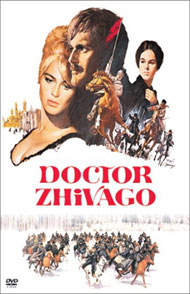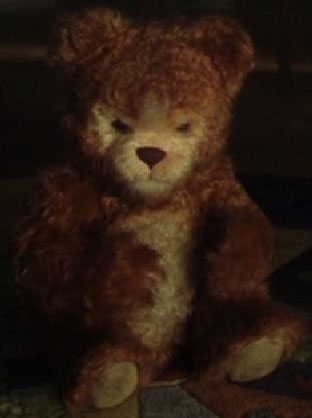
Doctor
Zhivago
(1965)

Rated: PG-13
Runtime: 3 Hours and 17 Minutes
Reviewer: Dale
Grade: A+David Lean has a power that few filmmakers possess. You may think to yourself, "I'm only going to watch a half hour of this and then off to bed" or "I'll watch half tonight and then half tomorrow". Simple, you think. No problem. But then you pop in the DVD or (poor saps) videocassette and before you know it you have succumbed to Lean's storytelling power. You sit powerless before the screen of your television and every ounce of your being will not let you avert your eyes until you have seen how it all turns out. I first noticed this bizarre phenomenon during "Lawrence of Arabia", a film I had no intention of finishing that night.
Even "Summertime" kept me enraptured for its entire running time, despite the fact that it was about nothing more important than Katherine Hepburn enjoying a holiday in Venice. And now, I have spent the entire night doing nothing but watching "Doctor Zhivago" for the second time in my life. I am sure that it is far from the last.
"Zhivago" has been described as an epic love story, but I believe that it is far more than that.
Dismissing it as a love story, comparing it to "Gone With the Wind", these things diminish the power of the film. It is the story of a man dealing with the changes of his country. It is the story of a man whose way of life is suddenly swept away. It is the story of a man facing difficult choices. And, yes, it is the story of a married man falling head over heels for another woman. A woman who stirs his soul like no other ever has.
Any description of the plot of this film would be rather pointless. How can I describe it accurately? The film simply flows the way that a novel or even reality does. There is no Act One, Scene Three, Conflict Arises moment that you may find outlined in a Screenwriting Manual. Or, if there is, it is so cleverly concealed that I was unable to find it. The film flows from one fascinating event to another, with the main character of Yuri Zhivago borne upon its back like a branch floating down a river. During the course of his lifetime, the entire social and political atmosphere of Russia changes and he is simply struggling to keep up. His country is never at a calm moment during the three hours we see him. I have never seen a film so accurately catalogue the events of an entire country through only a few select characters. It is truly masterful. You truly get a sense of the struggles and upheavals that Russia has been through and, I don't want to sound the America bullhorn yet again but, it does make you appreciate your own life and the country that we live in. You really feel sorry for the Russians. And you really get a sense of why Communism is such a bad idea.
Yet you also get a sense of the healing power of love. During many of the film's events, it is only Zhivago's undying love for Lara and even Tonya that keeps him going. There seems no end to the problems which await this man for much of the film's running time. And you wouldn't care so much about the passion of these two people (especially with revolutions going on and madmen traveling the country by train) if it were not for the simple, understated and genuine-seeming performances of both Omar Sharif and Julie Christie. If you think Omar was a revelation in "Lawrence of Arabia", then his portrayal of Yuri will leave you utterly breathless. And Julie Christie's work as Lara will simply floor you. I must also make mention of Geraldine Chaplin's performance as Tonya, Yuri's wife. You see where she's coming from also, and it makes things much more interesting since Yuri does not have a simple choice to make. In most films like this, it's easy: wife is a bitch, boyfriend is an asshole, other woman or man is a saint. But in this film Tonya is the saint if anything. It's very complex and fascinating.
And Omar wears the inner turmoil and frustration of his character in his eyes, on his face, in his posture.
Unlike most epics, this is a subtle film. It is confident enough to let you figure many things out for yourself. It takes the time to breathe. It also has a dense visual poetry. The emotions of the characters are often reflected in something as simple as the melting of frost on a window or the wilting of a vase of flowers. The characters do not throw fits. They do not scream and hurl insults. They keep their feelings largely bottled and until they can stand it no more and then they only spill out a little bit, just enough to gain our sympathy and respect. This movie has a quiet dignity and a simple power. The cinematography by Freddie Francis is awesome.
Many of the images are indelible. A train dwarfed by the mountains and the endless fields of snow. The ice castle of Varyniko. A single set of hoofprints through a snowy field. Ice cracking beneath the feet of walking soldiers. The atmosphere of the film is also magnificently established. You may want to keep a blanket handy during this film. The cold is almost a tangible thing. It is a character in the film, much like the shark in "Jaws" or the wave in "The Perfect Storm" (by the way, the wave was probably the most compelling character in that entire film). David Lean's skill with the actors and environments and camera was surpassed only by "Lawrence of Arabia".
I must also give notice to the great acting of Alec Guinness (yet more proof that this man should be remembered for far more than just his work as Obi Wan Kenobi), Rod Steiger, and Ralph Richardson. I also must credit the set designs, the beautiful score of Maurice Jarre, and pretty much every other aspect of the film. The movie stirs with the magical power of love, the hypnotic imagery, and the poetry which seems to run through its veins.
"Doctor Zhivago" is amazing. I can't think of any other way to describe it. And I can think of no better reason for you to get yourself addicted to it.
